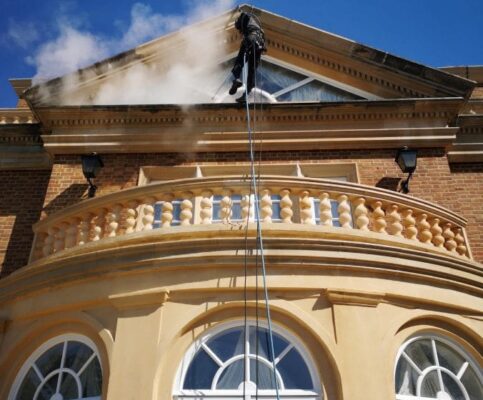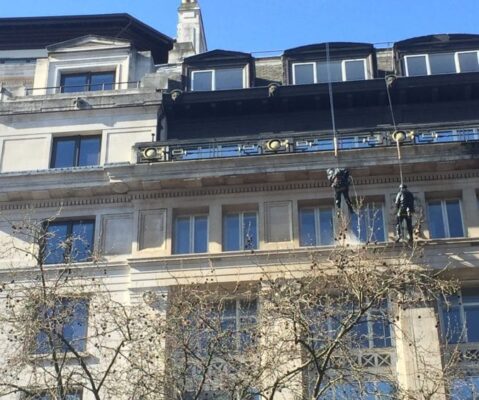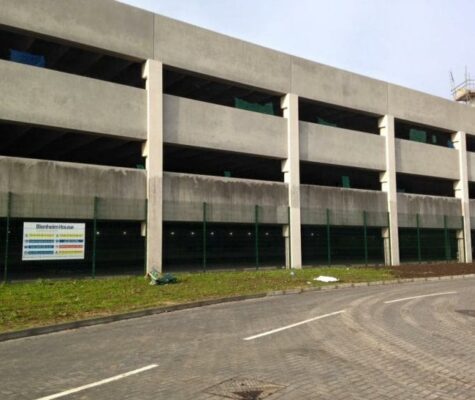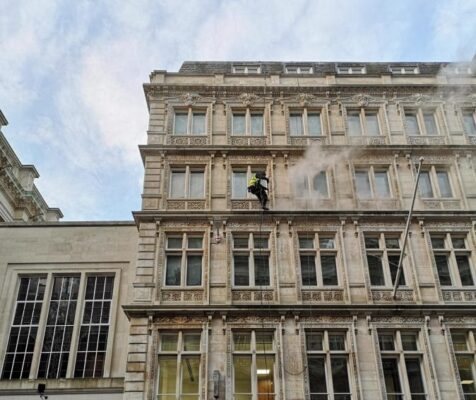View More SErvices Contact Us
Facade Cleaning in Silvertown
Cleaning building facades from top to bottom, no matter how tall your building.
Natural stone facade cleaning in Silvertown can be accessed and cleaned efficiently and effectively by using rope access methods. Using this method, the need for local authority permits is totally eradicated, allowing works to proceed immediately. Using professional stone cleaning equipment we can roll back the years to make your building look like new.
Brick cleaning
Brick buildings become dirty as much as any other building. We will not only clean away the dirt and grime, we can revitalise the colour. Using a range of bio-degradable chemicals, we can restore the colour of red or yellow bricks.
Contact UsGlass facade cleaning in Silvertown
Glass facade cleaning in Silvertown takes place by abseilers using traditional window cleaning tools. External windows, internal atriums, after builders cleaning or regular maintenance cleans, our abseilers are experienced in all manner of glass cleaning.
Contact UsAluminium cladding cleaning
Aluminium cladding in Silvertown can become extremely dirty over time. Warehouses that have many lorries coming and going will become soiled with traffic film. Using our steam cleaning systems, this grime is washed away leaving a lasting first impression for your visitors.
Contact UsOur services
Rope Access Facade Cleaning Services for Silvertown And Surrounding Counties

Residential property Stone Facade Cleaning
Façade cleaning at this residential property in Silvertown, which was not of any great height but, had no access for other forms of access equipment. Abseiling was the solution and the results were outstanding.

Stone Steam Cleaning in London
This beautiful natural stone building was looking tired from the day to day London traffic. Rope access was seen as the most cost-effective method of access.

Concrete Facade Cleaning in Silvertown
This car park in Essex was filthy. It hadn’t been cleaned, ever. As the access to three elevations was extremely tight, abseiling was the only method that could achieve the results.

Facade Cleaning in Silvertown
A new acquisition for our client needed a freshen up. Out of hours abseiling was the best way to clean this building in the heart of the City of London.
Brick colour restoration
Before colour restoration
This client requested a test patch before assigning us the job of cleaning their building. We carried this out with amazing results.
After colour restoration
These are the pictures of the test patch that we sent to the client. Her reaction was simply ‘WOW’. That’s the perfect response for us.
Torik Stone Cleaning System Features
150 degrees centigrade steam cleaning power
Provides a continues flow of superheated water to penetrate stone and deep clean, removing organic growth & ground in dirt.
We use Tensid (uk) Ltd
Providers of specialist cleaning equipment and specialist cleaning chemicals to professionals.
Get In Touch
Fill in the form below and we’ll be in touch within 24hrs of receiving your message.
Facts About Silvertown
Silvertown History
In 1852 S.W.Silver and Co moved to the area from Greenwich and established a rubber works, originally to make waterproof clothing. This subsequently developed into the works of the India Rubber, Gutta Percha and Telegraph Works Company, which constructed and laid many submarine cables. By the 1860s a number of manure and chemical works and petroleum storage depots had been set up.
Sugar refiners in the area were joined by Henry Tate in 1877 and Abram Lyle in 1881, whose companies merged in 1921 to form Tate & Lyle. Prior to the merger, which occurred after they had died, the two men were bitter business rivals, although they had never met.
General Info
Silvertown is a district and forms part of the Port of London in the London Borough of Newham, in east London, England. It lies on the north bank of the Thames and a major £3.5billion redevelopment of the area was approved in 2015. It was named after the factories established by S. W. Silver and Co. established by Stephen William Silver in 1852.



